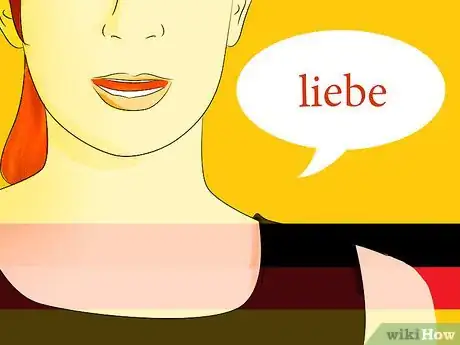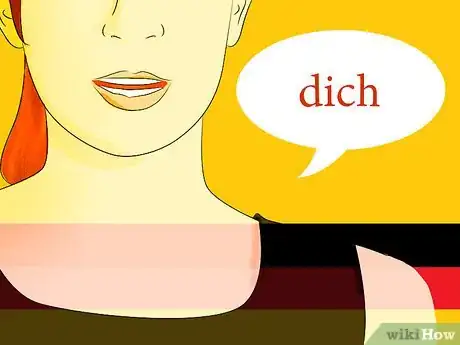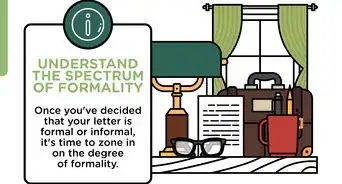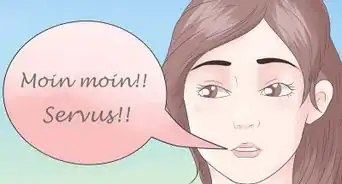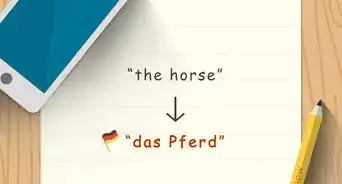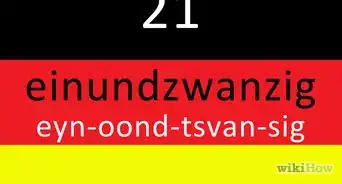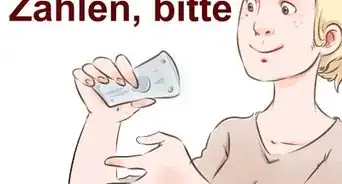wikiHow is a “wiki,” similar to Wikipedia, which means that many of our articles are co-written by multiple authors. To create this article, 18 people, some anonymous, worked to edit and improve it over time.
There are 7 references cited in this article, which can be found at the bottom of the page.
This article has been viewed 361,056 times.
Learn more...
Interested in how to say "I love you" in German? Well good for you. It's very simple and almost anyone can say it. Learn to impress someone with your German skills or express your feelings to your Schatzy.
Steps
Saying the Basic "I Love You"
-
1Say "I love you" by saying "Ich liebe Dich."[1] We'll show you how to pronounce each single word, but phonetically it sounds something like this: [ɪç 'li:bə dɪç].
-
2Say "ich." This is the "I" in "I love you." The /ch/ sound in "ich," which is also called a voiceless palatal fricative, isn't pronounced the same way you would pronounce it in English.[2] It sounds something like the /j/ sound in Spanish, kind of like a snake hissing.
- The /ch/ sound is really hard for non-native speakers to master. Most English-speakers getting away with saying "ish," as in "finish" or "fish."
Advertisement -
3Say "liebe." This is the "love" in "I love you." Say this slowly "lee-buh."[3] The "l" is pronounced normally but the "ie" is pronounced as "ee" like in "tree" and "bee." The "be" at the end of it is pronounced like the "b" in "burn." Put it together to form "liebe."
-
4
Other Ways of Saying (Or Approximating) "I Love You"
-
1Say "I have fallen in love with you." A different, albeit more formal, way of saying "I love you," this wording is very romantic. Here's how you say it: "Ich habe mich in dich verliebt."[6] The phonetic pronunciation is [ɪç 'ha:bə mɪç ɪn dɪç fɛɐ'li:pt].
-
2Say "I like you a lot." To say this: "Ich mag dich sehr," which literally translates to "I like you very" (although a bit smoother in German).[7] The phonetic pronunciation here is [ɪç ma:k dɪç ze:ɐ].
-
3Say "I like you." To say this: "Du gefällst mir."[8] The phonetic pronunciation here is [du: gə'fɛlst mi:ə].
-
4Add terms of endearment to your compliments. If you really want your compliments to leave a mark, be sure to add a term of endearment to your I love you's. Here are two specifically that you can use:
- "Schatz," meaning "sweetheart" but literally "treasure."[9] Phonetically, it's pronounced [ʃats]. Try "Mein Schatz, ich liebe dich!" or "Ich liebe dich, Schatzi."
- "Liebling," meaning "darling." Phonetically, it's pronounced ['li:plɪŋ]. Try "Liebling, du bist so hübsch." ("Darling, you are so pretty.")
Community Q&A
-
QuestionWhat does "herzliche Grüße" mean?
 Community AnswerIt means "affectionate regards."
Community AnswerIt means "affectionate regards." -
QuestionHow would I say "I love your pictures" in German?
 Community Answer"Ich liebe Ihre Bilder."
Community Answer"Ich liebe Ihre Bilder." -
QuestionHow do I say "Hungary" in German?
 Community AnswerIn German, the word "Hungary" would be translated to "Ungarn", which is pronounced "Un-gun".
Community AnswerIn German, the word "Hungary" would be translated to "Ungarn", which is pronounced "Un-gun".
Warnings
- Do not pronounce "ich" as "itch".⧼thumbs_response⧽
- Do not say it unless you mean it.⧼thumbs_response⧽
- Do not make the rookie mistake of saying "Ich liebe du" instead of "Ich liebe dich".⧼thumbs_response⧽
- Do not pronounce "dich" as "ditch".⧼thumbs_response⧽
- These pronunciations aren't completely correct, they are just guidelines. To hear them correctly, make google translate read it out loud for you.⧼thumbs_response⧽
References
- ↑ https://www.youtube.com/watch?v=PeYS-rhqWC4
- ↑ https://www.andrew.cmu.edu/user/ujf/blog/German_ch.html
- ↑ https://www.collinsdictionary.com/dictionary/german-english/liebe
- ↑ https://web.stanford.edu/~jrb/reference/german.html
- ↑ https://en.langenscheidt.com/german-english/dich
- ↑ https://www.clozemaster.com/blog/i-love-you-in-german/
- ↑ https://www.clozemaster.com/blog/i-love-you-in-german/
- ↑ https://www.clozemaster.com/blog/i-love-you-in-german/
- ↑ https://www.dict.cc/german-english/Schatz.html
About This Article
To say “I love you” in German, say “Ich liebe Dich.” “Ich” means “I” and sounds a bit like “ish” as in “fish.” Next is “liebe” or “love,” which is pronounced “lee-buh.” “Dich” ends in the same sound as “ich” and is the word for “you.” To further profess your love, you can add some terms of endearment, such as “schatz,” which means “sweetheart,” or “liebling,” which means “darling.” If you want to learn how to say phrases like "I have fallen in love with you," keep reading the article!


